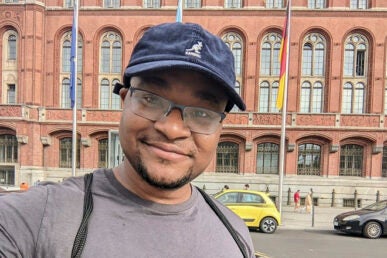Philosophy doctoral student gets research grant to study Kant
In 1781, German philosopher Immanuel Kant proposed the theory of transcendental idealism — the idea that space and time are subjective creations of the human mind.
Now, almost 250 years later, UIC doctoral student Joshua Williams has earned a research grant to live in Berlin and study Kant’s philosophy.

Receiving the Deutscher Akademischer Austauschdienst Research Grant allows Williams to live in Berlin full time for up to one year to closely scrutinize the renewed debate around Kant’s philosophy.
“(The grant) will allow me to work closely with leading Kant scholars, access German texts from the 18th century and improve my German language skills,” Williams said. “This research will further my understanding of Kant’s original German texts and (could) change my interpretation of transcendental idealism,” Joshua said.
Daniel Sutherland, a professor in UIC’s philosophy department and Williams’ advisor, is enthusiastic about Williams’ potential contributions to the field.
“Joshua convincingly argues that these new interpretations do not do justice to Kant’s idealism and argues for an alternative that does,” Sutherland said. He believes Williams’ ability for original philosophical thought and his tenacious working of the text will enable him to break new ground.
“Joshua is on his way to making original contributions to the ongoing debate, and I am confident that he will make important contributions to our understanding of Kant’s philosophy,” said Sutherland, who is also president of the North American Kant Society.
Despite the theory being posited more than 200 years ago, Kant’s transcendental Idealism is still being debated by modern philosophers. Inspired by a new line of interpretation, Kant’s theory has garnered increased attention in the last few decades.
“We normally assume that our representations of external objects are determined by the characteristics of those objects,” Williams said. “There is — in my mind — a representation of a cube that aims to correspond to an external object: the Rubik’s Cube on my desk. In contrast, Kant argued that knowledge of outer objects is only justifiable under the presupposition that the entire world depends on the mind,” Williams said. “The world that we experience must conform to the conditions of the human mind that allow us to experience it.”
Williams earned a bachelor’s degree in philosophy and psychology in 2017 and a master’s degree in philosophy in 2020, both from UIC.
Reinterpreting one of the canon texts of Western philosophy is a daunting prospect but one Williams is ready to undertake. He is also excited to live in Germany’s most populous city.
“Research interests aside, Berlin has numerous cultural experiences on offer,” Williams said. “Of course, there are the landmarks, museums and natural vistas. But I am especially excited to learn more about German history and classical music, as I have a passing interest in these subjects. Lastly, I will be sure to sample my fair share of German food. I can almost taste the currywurst!”
Categories
